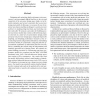Free Online Productivity Tools
i2Speak
i2Symbol
i2OCR
iTex2Img
iWeb2Print
iWeb2Shot
i2Type
iPdf2Split
iPdf2Merge
i2Bopomofo
i2Arabic
i2Style
i2Image
i2PDF
iLatex2Rtf
Sci2ools
121
click to vote
MICRO
2006
IEEE
2006
IEEE
A Predictive Performance Model for Superscalar Processors
Designing and optimizing high performance microprocessors is an increasingly difficult task due to the size and complexity of the processor design space, high cost of detailed simulation and several constraints that a processor design must satisfy. In this paper, we propose the use of empirical non-linear modeling techniques to assist processor architects in making design decisions and resolving complex trade-offs. We propose a procedure for building accurate non-linear models that consists of the following steps: (i) selection of a small set of representative design points spread across processor design space using latin hypercube sampling, (ii) obtaining performance measures at the selected design points using detailed simulation, (iii) building non-linear models for performance using the function approximation capabilities of radial basis function networks, and (iv) validating the models using an independently and randomly generated set of design points. We evaluate our model buil...
Related Content
| Added | 12 Jun 2010 |
| Updated | 12 Jun 2010 |
| Type | Conference |
| Year | 2006 |
| Where | MICRO |
| Authors | P. J. Joseph, Kapil Vaswani, Matthew J. Thazhuthaveetil |
Comments (0)

